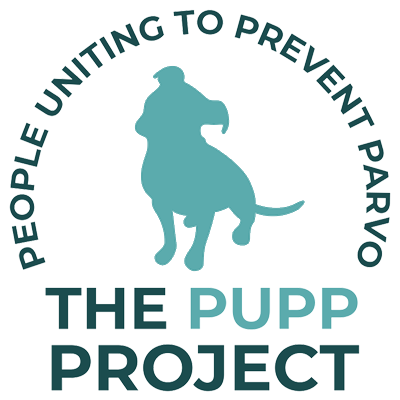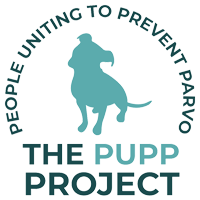Our Mission
Our mission is to eradicate canine parvovirus in New Zealand by raising awareness about vaccination and providing free or low-cost dog vaccinations to low income families.
By vaccinating a large proportion of dogs within a community, we can significantly reduce the spread and risk of parvovirus.
About Parvovirus
Every year, hundreds of New Zealand dogs die from a disease caused by canine parvovirus.
The virus is highly contagious and survives 1 year or more in the soil.
It kills by causing severe bloody diarrhoea, bone marrow suppression, dehydration & shock.
Dogs less than 1 year of age are at greatest risk but the good news is that they can be protected by vaccination.
About Vaccination
Puppies should be vaccinated against parvovirus every 3-4 weeks, starting at 6 weeks of age, and continuing until they are at least 16 weeks of age or older.
It is crucial that the final vaccination be given at or after 16 weeks of age in order to provide long lasting immunity.
Adult dogs only need a single vaccination against parvo.
Parvo vaccination is given via a safe and simple injection under the skin.
Vaccination (using a modified live virus vaccine) is highly effective and protects dogs for 3 years or more.
Frequently Asked Questions
Does my dog need to be microchipped or registered?
- We are not affiliated with the council and do not provide or regulate registration or microchipping, even though these are legal requirements for owning a dog in New Zealand.
- Regardless of whether your dog is registered, we strongly recommend your dog is microchipped. A microchip goes under your dogs skin and allows him/her to be identified and reunited with you, even if he/she is not wearing a collar. It also serves as permanent identification, in case your dog is stolen.
- You can get your dog microchipped at any vet clinic but make sure the price includes registration on the NZ Companion Animal Register (NZCAR). This is a private register, which is not linked in any way to the council. Pet owners can register their own pet’s microchip on the site by paying a small fee ($15). The benefit with this system is that if your dog becomes lost or injured, a local vet clinic can look up your details and notify you, without having to contact the Council and your dog ending up at the pound.
- If your dog is microchipped, you can lookup the number on NZCAR (https://www.animalregister.co.nz) to see if it is registered then confirm or change your details.
Why doesn’t the Pupp Project offer vaccination for older dogs?
- Parvo is so common and contagious that it is likely for older dogs (especially those who have survived past 2 years without getting sick from Parvo) to have immunity, either from previous successful vaccination (especially vaccines given past 4-6 months of age) or exposure to the virus, as both of these situations create antibodies which provide long-lasting (potentially lifelong) protection against parvovirus.
- However, an adult dog that is living in an area where parvo is not common or is not exposed to high risk environments (e.g. by being kept solely on the property) may not have immunity but has not gotten sick yet due to not having encountered the virus yet.
- If your dog is b/w 12-18 months, has never been vaccinated or known to have survived parvo, a single vaccine is recommended; We may be able to provide this – let us know if you think your dog is at risk
Why do dogs over 16 weeks only need a single vaccination?
- Dogs over 16 weeks of age no longer have any maternal antibodies left in their system. Maternal antibodies are those passed on during pregnancy and they protect the puppy for the first few weeks of life but they also interfere or block the vaccine so it is only when these are gone that the vaccine can take effect and help the puppy create its own antibodies, which will protect him/her long term. Maternal antibodies wear off gradually, with 90% of dogs having none left by 12 weeks and 100% having none left by 16 weeks.
- Since we don’t know exactly when an individual puppy’s antibodies have worn off, we repeat the vaccination every few weeks in the hopes of getting vaccine protection as soon as maternal antibodies are low enough not to interfere. Some vaccines even have superior efficacy at cutting through maternal antibodies to protect the puppy at a younger age than other vaccines.
- So vaccine boosters for parvovirus is not about creating “booster cells” – they are modified-live virus vaccines, so they only need to get in once (without interference) to work. Our goal is simply to minimise the window of risk between maternal antibody protection and vaccine-induced antibody protection.
- The booster that is commonly recommended at 6-12 months of age is simply an extra precaution, in case, for some reason, the vaccine didn’t take at the 16 week mark. This can happen if the dog’s age was overestimated. One way to tell that a dog is over 16 weeks is their teeth; Teething begins at 18 weeks of age and starts along the incisors (front teeth) first. We use this to give us confidence that your dog is over 18 weeks and The Pupp Project will typically make this the last vaccination.
- Please note: Our recommendations may differ from your local vet clinic’s. Our recommendations are tailored for low-income families and based solely on parvovirus risk (not other infectious diseases like leptospirosis). Your local vet clinic’s recommendations are likely factoring in combining parvo vaccines with other vaccines, as well as following vaccine manufacturer and best practice guidelines.
How often should my puppy be vaccinated?
- Puppies should be vaccinated against parvovirus every 3-4 weeks from 6 weeks to 16 weeks of age
- Dogs over 4-6 months of age only need a single vaccination with a booster recommended every 3 years, although protection has been shown to last much longer than this (even lifelong)
What other vaccines are important?
- Dogs living in the North Island, especially in rural areas should be vaccinated against leptospirosis (lepto). While less common, the disease is serious and can spread to humans. Lepto vaccination is available through with your local vet clinic
What else do I need to know about looking after a puppy?
- Worms – Puppies are born with worms so must be de-wormed every 2-3 weeks from 4-12 weeks of age then every 1-3 months
- Fleas – cause itching & hair loss around the backend and tail. Prevention is best using monthly topical (e.g. Evance®) or oral (Simparica®, Nexgard®) treatment. Bravecto® chews last 3 months.
- Desexing – Neutering males reduces roaming, fighting and prostate problems. Spaying females prevents unwanted pregnancy, mammary cancer and pyometra (life-threatening uterine infection)
Which age group is at highest risk of getting sick from parvovirus?
- If not vaccinated, puppies over 12-16 weeks have the highest risk. Younger puppies (6-12 weeks) are also at risk but are more likely to have protection from maternal antibodies but protection gradually wears off, with 90% of dogs having lost maternal antibody protection by 12 weeks of age, and 100% by 16 weeks.
How is parvo spread?
- Parvovirus is spread through faeces. It spreads very easily because it can live on surfaces for up to 12 months!
- Contaminated surfaces should be disinfected with diluted bleach and all bedding / toys / leashes etc that an infected dog has been in contact with should be bagged securely and thrown out.
- Affected dogs should be isolated and separated from other dogs. If a dog with parvo has been on your property, keep all other dogs away for at least 1 year.
What are the symptoms of parvo?
- Parvovirus causes severe bloody diarrhoea, dehydration, and destruction of bone marrow. Most dogs become seriously ill, suffer and die without treatment.
How is parvo treated?
- Dogs with parvo need veterinary care as soon as possible to give them a chance of surviving.
- Treatment involves IV fluids, anti-nausea and antibiotics for 5-14 days (depending on the severity)
- Treatment is expensive and not always successful. Even with intensive care, many dogs die.
- Euthanasia is a humane option, especially if finances are limited. As devastating as it is to say goodbye to a beloved pet, it is often the kindest thing to do as it relieves the immense suffering that parvo causes (death from parvo is slow).
- If you suspect your dog has parvo, call the vet as soon as possible and let them know you think your dog may have parvo. Do not bring your dog into the building as this will spread the virus. The vet will likely assess your dog in the caror outside.
If finances are limited, you may be able to get a voucher from the SPCA so it may be best to phone them first to discuss your situation.
About Us
We are a team of Auckland based veterinarians, vet nurses & dog lovers who want to see a reduction in the number of parvo cases in New Zealand.
We have seen first hand the impact of this disease; from the suffering of infected dogs to the heartache & distress of dog owners and veterinarians involved in each case.
Knowing that this disease is so easily prevented by vaccination makes it even more heartbreaking.
We are making a difference by providing free or low-cost parvo vaccinations to dogs belonging to low income families.
Our focus is on communities where the risk of parvo is high due to low rates of vaccination.
We also aim to increase public awareness about parvovirus and educate people on responsible dog ownership.
How you can help
You can help by:
Donating money to pay for vaccines & equipment.
Our bank account number details are:
Pupp project
02-0110-0210500-000
Or you can donate via our give a little page: https://givealittle.co.nz/cause/pupp-project
We are a registered New Zealand charity (reg # CC57307)
Contact Us
Address:
PO BOX 142
Whitford
Auckland 2149
Use the form below to get in touch.

